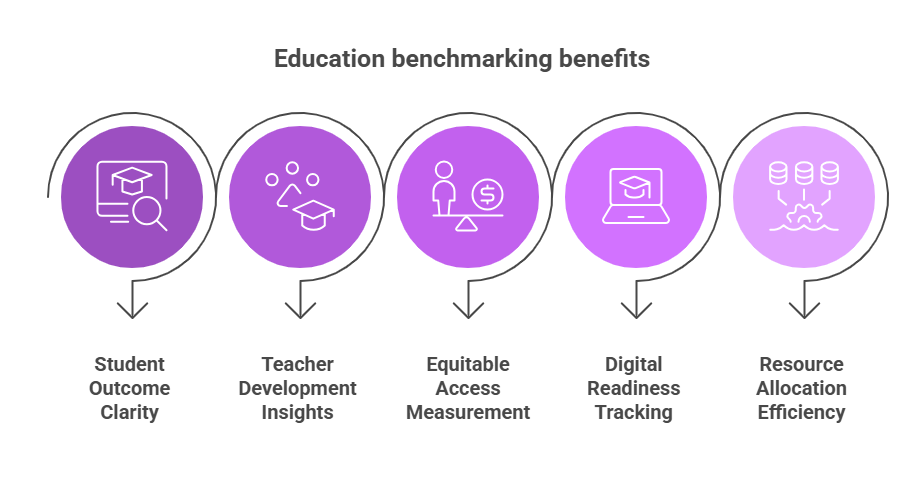The K–12 education sector is under increasing pressure to deliver measurable improvements in student outcomes, teaching quality, and equity of access. Parents demand better learning experiences, policymakers seek accountability, and schools face the challenge of preparing students for a future shaped by digital skills and global competitiveness. Traditional methods of evaluating performance often fall short, as they rely on fragmented data or intuition rather than objective comparisons.
This is where performance benchmarking becomes a powerful tool. By systematically comparing academic outcomes, teaching practices, and resource allocation against peer schools and global standards, benchmarking provides a clear, evidence-based foundation for decision-making. It enables educators, administrators, and policymakers to identify gaps, set realistic targets, and implement improvements that truly impact the classroom.
Why Performance Benchmarking Matters in K–12
In K–12 education, performance benchmarking plays a critical role in moving schools and education systems toward evidence-based decision-making. It helps administrators and policymakers go beyond intuition to measure what actually drives improvement.
Key reasons why benchmarking matters include:

- Clarity on Student Outcomes – By comparing test scores, literacy and numeracy levels, and overall skill readiness across schools, benchmarking highlights performance gaps that need immediate attention.
- Teacher Development Insights – Benchmarking teacher effectiveness, training hours, and pedagogical practices allows schools to align faculty development with global best practices.
- Equitable Access Measurement – Benchmarking enrollment and completion rates across gender, socio-economic groups, and geographies ensures inclusivity in education delivery.
- Digital Readiness Tracking – With hybrid learning models becoming the norm, benchmarking digital adoption helps schools assess their preparedness for technology-driven classrooms.
- Resource Allocation Efficiency – Comparing per-student expenditure and infrastructure utilization reveals how effectively schools are investing in student success.
By providing these insights, performance benchmarking ensures that K–12 institutions don’t just react to challenges, but proactively design strategies that improve quality, access, and equity in education.
Nexdigm’s Education Competitive Intelligence Approach
At Nexdigm, we help education stakeholders transform benchmarking data into actionable strategies that drive measurable improvements in K–12 systems. Our Education Competitive Intelligence services are built to provide a comprehensive view of how schools and education systems perform compared to peers and global leaders.
Our approach includes:
- Student Outcome Benchmarking – Measuring exam performance, literacy and numeracy skills, and holistic learning indicators against best-in-class systems.
- Teacher Performance Mapping – Comparing faculty training, instructional practices, and student engagement outcomes to highlight areas for professional development.
- Operational Efficiency Benchmarking – Evaluating resource allocation, infrastructure utilization, and per-student spending to optimize investments.
- Digital Adoption Analysis – Benchmarking the integration of e-learning tools, hybrid classrooms, and digital literacy programs.
- Global Best Practice Alignment – Mapping insights from high-performing K–12 systems worldwide to design region-specific improvement strategies.
By combining data-driven analysis with consultative execution, Nexdigm enables schools, administrators, and policymakers to implement evidence-based improvements that strengthen teaching quality, enhance student outcomes, and build more equitable education systems.
To take the next step, simply visit our Request a Consultation page and share your requirements with us.
Harsh Mittal
+91-8422857704

